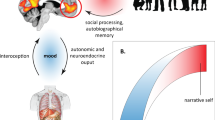Abstract
The 150th birthday of Sigmund Freud has triggered widespread interest and media coverage on his unique contribution and impact on society. Recent evidence from neuroscience and advanced imaging technology has provided support for some of his major concepts including the unconscious and the key role of early life events. In this perspective, we attempt to write on his behalf an updated version of a Freudian way of thinking focused on the current high rates of obesity and depression.
This is a preview of subscription content, access via your institution
Access options
Subscribe to this journal
Receive 12 print issues and online access
$259.00 per year
only $21.58 per issue
Buy this article
- Purchase on Springer Link
- Instant access to full article PDF
Prices may be subject to local taxes which are calculated during checkout
Similar content being viewed by others
References
Bryant RA . Posttraumatic stress disorder and traumatic brain injury: can they co-exist? Clin Psychol Rev 2001; 21: 931–948.
Gil S, Caspi Y, Ben-Ari IZ, Koren D, Klein E . Does memory of a traumatic event increase the risk for posttraumatic stress disorder in patients with traumatic brain injury? A prospective study. Am J Psychiatry 2005; 162: 963–969.
Phelps EA, LeDoux JE . Contributions of the amygdala to emotion processing: from animal models to human behavior. Neuron 2005; 48: 175–187.
Keeley MB, Wood MA, Isiegas C, Stein J, Hellman K, Hannenhalli S et al. Differential transcriptional response to nonassociative and associative components of classical fear conditioning in the amygdala and hippocampus. Learn Mem 2006; 13: 135–142.
Phillips RG, LeDoux JE . Differential contribution of amygdala and hippocampus to cued and contextual fear conditioning. Behav Neurosci 1992; 106: 274–285.
Rogan MT, Staubli UV, LeDoux JE . Fear conditioning induces associative long-term potentiation in the amygdala. Nature 1997; 390: 604–607.
Kosten TA, Lee HJ, Kim JJ . Early life stress impairs fear conditioning in adult male and female rats. Brain Res 2006; 1087: 142–150.
Costa-Mattioli M, Gobert D, Harding H, Herdy B, Azzi M, Bruno M et al. Translational control of hippocampal synaptic plasticity and memory by the eIF2alpha kinase GCN2. Nature 2005; 436: 1166–1173.
Gunstad J, Paul RH, Spitznagel MB, Cohen RA, Williams LM, Kohn M et al. Exposure to early life trauma is associated with adult obesity. Psychiatry Res 2006; 142: 31–37.
Kirkham TC, Tucci SA . Endocannabinoids in appetite control and the treatment of obesity. CNS Neurol Disord Drug Targets 2006; 5: 272–292.
Matias I, Gonthier MP, Orlando P, Martiadis V, De PL, Cervino C et al. Regulation, function and dysregulation of endocannabinoids in models of adipose and {beta}-pancreatic cells and in obesity and hyperglycemia. J Clin Endocrinol Metab 2006; 91: 3171–3180.
Jo YH, Chen YJ, Chua Jr SC, Talmage DA, Role LW . Integration of endocannabinoid and leptin signaling in an appetite-related neural circuit. Neuron 2005; 48: 1055–1066.
Wells JC . The evolution of human fatness and susceptibility to obesity: an ethological approach. Biol Rev Camb Philos Soc 2006; 81: 183–205.
Dahlquist G . Can we slow the rising incidence of childhood-onset autoimmune diabetes? The overload hypothesis. Diabetologia 2006; 49: 20–24.
Bornstein SR, Schuppenies A, Wong ML, Licinio J . Approaching the shared biology of obesity and depression: the stress axis as the locus of gene–environment interactions. Mol Psychiatry 2006; Aug 1 (Epub ahead of print).
Author information
Authors and Affiliations
Corresponding author
Rights and permissions
About this article
Cite this article
Bornstein, S., Wong, ML. & Licinio, J. 150 years of Sigmund Freud: what would Freud have said about the obesity epidemic?. Mol Psychiatry 11, 1070–1072 (2006). https://doi.org/10.1038/sj.mp.4001912
Received:
Accepted:
Published:
Issue Date:
DOI: https://doi.org/10.1038/sj.mp.4001912
Keywords
This article is cited by
-
Global meta-analysis of the C-11377G alteration in the ADIPOQ gene indicates the presence of population-specific effects: challenge for global health initiatives
The Pharmacogenomics Journal (2009)
-
Chronic treatment with caffeine blunts the hyperlocomotor but not cognitive effects of the N-methyl-d-aspartate receptor antagonist MK-801 in mice
Psychopharmacology (2003)



